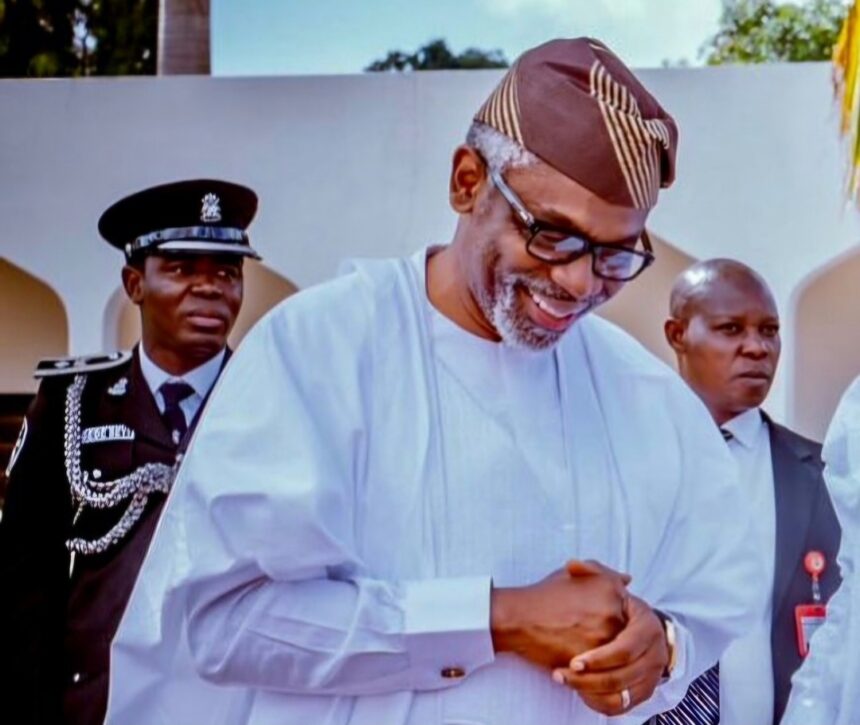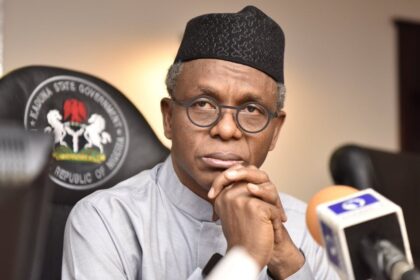● Free buses for the young, old, and weary: President Tinubu’s Chief of Staff eases transportation with 33 branded buses
● Empathy in leadership: Statesman writes a new chapter in grassroots governance
Where others construct legacies of marble and monument, Rt. Hon. Femi Gbajabiamila has chosen a nobler path: one paved with empathy and untarnished service. With the quiet dignity of a servant-leader and the noble heart of a people’s champion, he has launched the GbajaRide scheme, an ambitious and compassionate gesture that delivers free transportation to schoolchildren and the elderly across Surulere, his beloved political cradle.

In a world too deaf to the sobs of the vulnerable, and too blind to the travails of schoolchildren and the elderly, Gbajabiamila dares to pave a new road, one that unfurls through Surulere: smooth, sunlit, and free. So doing, the Chief of Staff to the President of the Federal Republic of Nigeria, Bola Tinubu, has reasserted his commitment to the wellbeing of his people.
Vision in Motion
Gbajabiamila made history on a bright Saturday morning as the streets of Surulere bore witness to an unfurling of his legacy: the GbajaRide initiative unveiled 33 specially branded buses, 13 units of 32-seater coaches and 20 units of 18-seater King Long vehicles.
His donation resonates with the timeless philosophy which highlights that governance is not mere administration, but a fulfillment of the masses’ dreams. Speaking with the sincerity that has marked his political journey, Gbajabiamila declared that he is “not tired of serving Surulere,” a place he calls “a good kind of stress.” His voice, firm with conviction, underscored a principle too often forgotten: the true essence of governance is to help people pursue and achieve their God-given ambitions.

For many schoolchildren in Lagos, every dawn brings with it, unavoidable rigours hindering learning, particularly the dread of distance. For the elderly, every errand is a quiet battle with aching joints and rising fares. Gbajabiamila’s intervention is nothing short of redemptive, a reversal of these daily agonies.
“The purpose of government, and indeed the point of all public service,” he said, “is to create the conditions that allow individuals and society to pursue their God-given ambitions… and thrive through the best efforts.” This belief, he stressed, aligns fully with the Renewed Hope agenda of President Bola Tinubu’s administration, a plan that seeks not just to govern but to uplift.
With this, GbajaRide becomes more than a logistical convenience; it becomes a life raft. Children once absent from class for lack of fare now ride in dignity. Elders, once stranded, now travel freely. The poor, often left behind, now move forward—with grace, with pride, and without charge.
A Ride into Relief
While the programme offers free rides to primary and secondary school students and citizens aged 65 and above, its generosity does not stop there. In partnership with the Lagos Metropolitan Transport Authority (LAMATA), the GbajaRide fleet also offers deeply discounted services—25% below standard fares—for the wider Surulere community.
This, Gbajabiamila explained, is a form of localized subsidy—a quiet counterpoint to the macroeconomic restructuring that followed the withdrawal of fuel subsidies. “The President has cleverly and rightfully removed subsidy from petrol,” he noted. “Very quietly, we have been able to at least here in Surulere subsidize transportation for our people. That is savings.”
These words, though softly spoken, carry the thunder of policy wisdom. They reveal a political actor not content with rhetoric, but intent on resolving real needs with real solutions.
In a country where generosity is often contingent on applause or electoral gain, Gbajabiamila has gone further. For the next three months, he has personally absorbed the costs of driver salaries, fuel, insurance, and maintenance, ensuring that the buses not only move, but move reliably, safely, and continuously.
This is no mere photo-op philanthropy. It is sustained, structured, and strategic giving. “We have, in our own little way, contributed to the development of the society,” he said, his tone imbued with both humility and resolve. “There is no thriving economy without a strong transport system.”
By underwriting these expenses, Gbajabiamila signals to other leaders that true public service is not an entitlement, but a heartfelt offering.

Applause from the Margins
The reaction from prospective beneficiaries has been electric—students and elders alike filled the air with gleeful chants, their gratitude unfiltered and free. For many, this initiative does not only relieves financial burdens, it restores dignity.
As one elderly resident put it: “For the first time in a long time, we feel seen. We feel remembered. We are not forgotten relics of a past election. This gesture by Hon. Gbajabiamila assures us that we still matter.”
Children clutched their school bags with renewed confidence, chattering about new routes and earlier arrivals to school. For parents, the scheme equally offers a respite from despair.
At the flag-off ceremony, the mood was jubilant yet reverent. Dignitaries drawn from across Lagos State graced the occasion with applause and affirmation. Dr. Kayode Opeifa, Managing Director of the Nigerian Railway Corporation and Project Advisor, called it a potent tool of poverty alleviation, estimating that beneficiaries could save up to ₦20,000 monthly and ₦240,000 annually—a sizable fiscal relief in these lean times.
Dr. Olukemi Amure, speaking on behalf of LAMATA’s Managing Director, commended Gbajabiamila for his foresight, assuring that her agency would work to sustain and possibly scale the gesture.
Pastor Cornelius Ojelabi, Chairman of Lagos APC, declared, “Gbajabiamila is not just the face of Surulere, but the heart of this party.” Represented by his deputy, Moshood Mayeigun, he added with poetic flourish, “With your name alone, we’re fit to go.”
But perhaps the most stirring part of Gbajabiamila’s speech was his subtle yet searing call to his fellow public servants: “Let all political appointees be selfless.” In this single sentence lies a revolution waiting to happen.
His message was clear: power is not for pomp, but for purpose. Every appointee, every officeholder, he urged, must commit to uplifting the constituency, not merely counting votes or victories. It is a standard as tall as it is rare, but Gbajabiamila has proved that it can be met.
Though now installed in the engine room of national governance as Chief of Staff to President Tinubu, Gbajabiamila’s heart remains forever tethered to Surulere. His loyalty to his roots runs deeper than politics; it is emotional, generational, spiritual.
Serving Surulere, he said, has been “a good stress.” Few statements capture the bittersweet nobility of leadership so vividly. In these words is the image of a man who does not rule from on high, but walks among his people—listening, loving, and lifting.
In a time marred by cynicism and the corrosion of public trust, Gbajabiamila’s GbajaRide scheme is a welcome anomaly—an oasis of hope on the arid plains of expectation.
It is not just about buses. It is about burden-lifting leadership. It is not about routes and terminals. It is about restoring the rhythm of everyday life for those who might otherwise fall behind. And in its quiet, consistent roll across the streets of Surulere, it reminds us that the wheels of governance can still turn with grace.
Femi Gbajabiamila has not only provided transport. He has offered a ride into the better angels of our public life—a journey that, if emulated by others, might yet carry Nigeria into the future it deserves.




